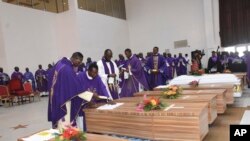Nigerian churches are introducing armed security and entry searches after a deadly June 5 attack on a Catholic church blamed on the Islamic State in West Africa Province (ISWAP). Security experts fear the attack in Nigeria's southwest Ondo state means the threat of terrorism is spreading and could soon reach the capital.
Abuja’s police said they have often deployed officers to churches, mosques and public places.
"These days people just become crazy and going to churches and start shooting," said Bishop John Praise Daniel, the presiding pastor of Dominion Chapel. "So I think the church must get to that level of arming themselves against any attack that would come, that is self-defense and there's no law against self-defense."
On June 5th, heavily armed men invaded St. Francis Catholic Church in the southwest city of Owo and killed 40 worshipers using guns and explosives.
Eighty-seven people survived but suffered serious injuries. Some of them described the attack as “unimaginable horror.”
"For such incident to have occurred, lasted for more than 20 minutes and there was no police presence," said Stephen-Chuks Okonye, who survived a bullet to his chest. "It means there's no security in this country. Security is one area the government has to look into."
Nigerian authorities blamed the Islamic state of West African Province or ISWAP for the shooting, but some experts say that was a hasty conclusion.
Experts also said the attack was an indication that terrorism is spreading in Nigeria.
Last week, gunmen in the Kajuru area of the northern Kaduna state attacked two churches, killed three people and kidnapped 36 others.
On Sunday, gunmen killed two clergymen in separate attacks in Kaduna and Edo states.
The Christian Association of Nigeria, (CAN), raised concerns about the attacks, criticized authorities for a lack of protection and urged church authorities to take stronger security measures.
"The church as a whole must be security conscious and be prepared. The next person to you is a suspect," said Joseph Daramola is the general secretary of CAN.
Nigeria's president, Muhammadu Buhari, promised to address general insecurity and boost Nigeria's economy when he first won office in 2015.
But as his second and final term comes to an end, gruesome attacks like the one in Owo will be remembered as the country prepares for next year’s elections.




